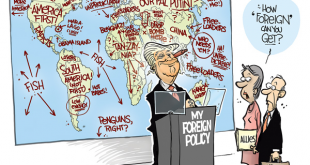That’s what Gerald Auten and David Splinter argue in a paper from last year. … new estimates of top income shares using two consistent measures of income. Our measure of consistent market income includes full corporate profits and adjusts for changes from TRA86, including changes to the tax base and increased filing by dependent filers. In addition, we include employer paid payroll taxes and health insurance and adjust for falling marriage rates. The effect of these adjustments on...
Read More »Border Adjustment Tax
On VoxEU, Mary Amiti, Emmanuel Farhi, Gita Gopinath, and Oleg Itskhoki discuss a border adjustment tax and its consequences. … a border adjustment tax … would make export sales deductible from the corporate tax base, while expenditure on imported goods would not be deductible … Therefore, if the border adjustment extends to all imports and exports, it is akin to a combination of a uniform import tariff and an export subsidy on all international trade … … it would limit the incentives for...
Read More »Tax Evasion in Hong Kong and the US
The Economist reports about new strategies to evade taxes. One is based on an occupational retirement scheme (ORS) in Hong Kong: A German or Australian with money to hide can set up a Hong Kong shell company, appoint himself as its director, with a local employment contract, and sign up with a trust company that provides an ORS. He can throw in cash, property or other assets, oversee the account himself, retire as soon or as far in the future as he likes, and then take out as much or as...
Read More »Probability of Trump Impeachment …
… according to PredictWise: Strongly rising, at 25%+. Tyler Cowen: Ditto, 25%.
Read More »Mankiw on the Congressional Tax Plan
In the New York Times, Greg Mankiw applauds the tax reform plan discussed in Congress. He emphasizes four points: The reform would move the US tax system toward international norms, from worldwide to territorial taxation. It would move the system from income towards less distorting consumption taxation, by allowing businesses to deduct investment spending immediately. The reform would change the origin-based into a destination-based system (taxing imports and exempting exports, a.k.a....
Read More »MXN/USD
The Mexican Peso has been recovering ever since Donald Trump assumed office. Its value has climbed back to nearly where it was at the time of the US election. Time series as reported by xe.
Read More »Portfolio Adjustments in Money Market Mutual Funds
On the Liberty Street Economics blog, Catherine Chen, Marco Cipriani, Gabriele La Spada, Philip Mulder, and Neha Shah discuss last year’s regulatory changes regarding money market mutual funds: First, institutional prime and muni funds—but not retail or government funds—must now compute their net asset values (NAVs) using market-based factors, thereby abandoning the fixed NAV that had been a hallmark of the MMF industry. Second, all prime and muni funds must adopt a system of gates and...
Read More »Trump: Unilateralism or Isolationism?
Summary: Many who think that the US is becoming isolationist are wrong. The thrust is now more about unilateralism. Unilateralism can lead to the US being more isolated. Domestic issues have dominated the news of the first 50 days of the Trump Administration. With the German Chancellor’s trip to Washington tomorrow, Secretary of State Tillerson in Asia, and the G20 meeting, foreign affairs may knock the debate...
Read More »America’s Miserable 21st Century
In Commentary, Nicholas Eberstadt recounts how low employment, deteriorating health, and declining social mobility in the United States foreshadow a “Miserable 21st Century.” Between 2000 and 2016, the work rate for Americans aged 20 or older fell by almost 5 percentage points, to 60 percent. In the “prime working age” group, it fell by almost 4 percentage points. While work rates for men had been falling for much longer, a similar decline for prime age women set in in 2000. Death rates...
Read More »U.S. Health Care Spending
A blog post on Random Critical Analysis argues that high wealth (proxied by high consumption) rather than GDP explains US health care expenditures. Total per capita health care spending increases as wealth increases because people actually demand more goods and services (volume) per capita and because it is relatively labor intensive sector that does not enjoy the productivity gains found in some other sectors of the economy, i.e., overall costs increase through both volume and price...
Read More » Swiss Economicblogs.org
Swiss Economicblogs.org

